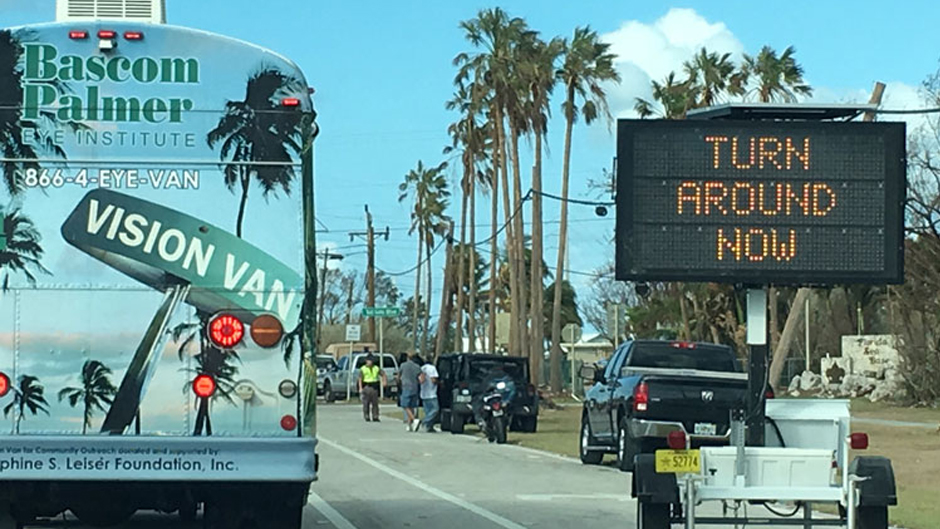A volunteer team from Bascom Palmer Eye Institute spent three days in Key West last week providing urgently needed vision care for residents, nurses, and disaster recovery personnel working to restore services in the Lower and Middle Keys that were devastated by Hurricane Irma.
“We moved quickly to equip our Vision Van for the disaster relief effort in the Keys,” said Eduardo C. Alfonso, M.D., director of Bascom Palmer Eye Institute, and professor and Kathleen & Stanley J. Glaser Chair in Ophthalmology at the University of Miami Miller School of Medicine. “The van served as a mobile hub for ophthalmic care for victims of Hurricane Katrina in 2006 and the Japanese earthquake-tsunami of 2011. This time, we provided assistance much closer to home.”
Mike Kelley, executive director of strategic operations at Bascom Palmer, coordinated the Keys relief mission with Barth Green, M.D., executive dean of global health and community service and professor of neurological surgery, and Andrew MacCalla, director of international programs and emergency response for Direct Relief, a global non-profit that provides medications and supplies to disaster victims.
“We started planning our response even before the hurricane hit the Keys on September 9,” said Kelley. “As we loaded up the Vision Van, we found supplies that had been donated by the Japanese Ophthalmological Society in gratitude for our support.”
On Tuesday, September 12, Richard K. Lee, M.D., Ph.D., associate professor of ophthalmology, made an advance trip to assess conditions in the Upper Keys and drop off a load of medications at the Islamorada Fire-Rescue station. He determined that ophthalmic care was a pressing medical need in the Keys, which had limited ophthalmic resources prior to the hurricane. The Vision Van rolled out of Bascom Palmer on Friday, September 15, carrying medications for glaucoma and other eye conditions, as well as eyeglasses and sunglasses for residents and first-responders that were donated by the Bascom Palmer Optical Shop.
Upon arrival at the Lower Keys Medical Center, the Vision Van team — Kelley, Lee, Leslie Small, O.D., staff optometrist, and Nandini Venkateswara, M.D., a Bascom Palmer ophthalmology resident — set up the mobile eye clinic and began seeing patients.
“Eye injuries are very common after a disaster, as are lost eyeglasses,” Lee said. “Restoring eye health is a priority, because when people can’t see, they are at high risk for other injuries, as their whole environment becomes unfamiliar.” In addition, with closed pharmacies people quickly run out of chronic eye medications and have a need for antibiotics for acute eye injuries.
During the weekend, the team treated more than 40 patients, primarily first-responders who were suffering from eye infections or broken and missing glasses, Lee said. “Fortunately, the emergency room doctors at Lower Keys Medical Center, led by Dr. Matthew Partzick, were handling immediate trauma injuries in consultation with us when they involved the eye.”
After leaving the Keys on Sunday, September 17, the Vision Van reloaded supplies in Miami and immediately left for Naples. Under the direction of Stephen G. Schwartz, M.D., professor of ophthalmology and Bascom Palmer at Naples medical director, the van will serve Southwest Florida patients until Bascom Palmer Eye Institute at Naples can reopen in keeping with its additional role as a mobile eye clinic for the South Florida community.
“It was an inspiring experience to see medical professionals and responders from places like Hawaii, California, Pennsylvania and Nebraska fly into the Keys to help Monroe County begin to recover from Irma,” said Lee, who has led an annual community vision screening for residents on Marathon Key, Big Pine Key, and Key West for many years. “It felt like the whole country came together, and we were proud to be part of that team effort.”
Story courtesy of UHealth News

